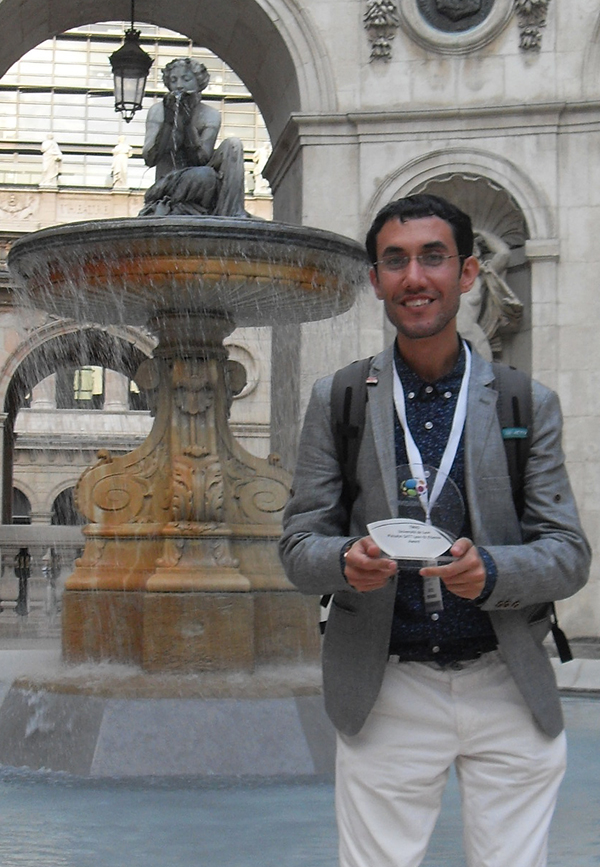 He's only two months into his PhD project and Mohamed Abdelsalam has already picked up an award.
He's only two months into his PhD project and Mohamed Abdelsalam has already picked up an award.
Abdelsalam, from Egypt, was one of 25 young scientists selected by TWAS’s five Regional Offices to participate in BioVision, the annual world life sciences forum in Lyon, France. On 15 April, in a special session immediately prior to the official opening of BioVIsion 2015, 14 TWAS-BioVision Next fellows presented their work to an expert jury, focusing mainly on its potential benefits to society. The young researchers also highlighted what would be needed – other than additional research – to bring any product forward to the market.
The expert jury selected seven of these projects to compete in the main BioVision Catalyzer event. Those seven fellows presented alongside start-up businesses from Europe and elsewhere that already had advanced development and marketing plans, sometimes requiring several million euros for further investment in development.
Although he didn’t win the main Catalyzer prize, Abdelsalam was selected for a special award for the most promising project presented by one of the seven TWAS-BioVision Next fellows. [See a video interview with Mohamed Abdelsalam.]
“I’m so thankful to TWAS, first for giving me the opportunity to study in Brazil through the TWAS-CNPq postgraduate fellowship programme, and now for this chance to attend BioVision,” said Abdelsalam, who studies at the School of Pharmaceutical Sciences, University of Sao Paulo.
Abdelsalam's journey toward becoming an award-winning researcher began with his master’s degree in pharmaceutical sciences from the University of Alexandria, Egypt. Earlier this year, he travelled from his home country to Brazil to start his studies on kidney stones, isolating and altering compounds from a tree used in traditional Brazilian medicine that might prevent kidney stones from forming.
“Kidney stones form through the aggregation of more and more tiny crystals of calcium oxalate, which makes up some 80% of the stones,” explained Abdelsalam. “No one completely understands why these crystals sometimes begin to aggregate into kidney stones, but we think we can prevent it from happening by using compounds isolated from the Copaifera tree, which is native to Brazil.”
Kidney stones affect millions of people worldwide – the World Health Organization estimates about 10 to 12% of the population in industrialized countries such as France, Japan and the United States are afflicted. And it is not just adults who are at risk. Kidney stones are also common in children worldwide.
Current treatments include laser therapies high energy shock waves that break down larger stones, surgery and dietary changes”, says Abdelsalam. “But these are only temporary measures,” he said. "Indeed, there is a 50% chance that a treated person will develop further stones within 7 to 10 years. We hope that our compound will help avoid this cycle of treatment and re-treatment and our initial tests are very positive.”
"I’ve learned so much in just two days about what it takes to move your research from the laboratory and to make it available for the benefit of society. Linking research to industry and the market is so important for solving many of the world’s problems,” said Abdelsalam, who is continuing his PhD research.
“TWAS can certainly change your life by opening gates of opportunities, especially if you are passionate enough to make some difference to yourself and to society,” said Almas Taj Awan from Pakistan, another of the TWAS-BioVision Next fellows who presented in the Catalyzer competition. Awan was awarded a TWAS-CNPq postgraduate fellowship in 2009, graduating in February 2013.
At BioVision, she presented her doctoral research carried out in Brazil, which she is continuing as a research collaborator along with her separate postdoctoral research. Her project focuses on producing bioethanol and other valuable compounds from citrus waste. Brazil is the world’s largest producer of oranges, mostly for the export of orange juice, which leaves millions of tonnes of citrus processing waste as a cheap and untapped resource. Awan’s work aims to transform this waste into a series of marketable products. [See a video interview with Almas Taj Awan.]
But as all the TWAS-BioVIsion Next fellows came to realize during their stay in Lyon, moving from the laboratory scale through prototype production units to large-scale commercialization requires expertise that most young scientists do not possess. In the case of Abdelsalam, his BioVision Catalyzer prize will help. Lyon is a global leader in medical and biotechnological research and innovation – hence the annual BioVision congress held there. And the TWAS-BioVision prize was also supported by the University of Lyon and Pulsalys SATT Lyon St. Etienne, a company that supports the development of innovative projects.
“TWAS and its partners at BioVision have provided me with a great opportunity,” said Abdelsalam. “It’s one I intend to grasp with both hands. They have really provided me with the incentive to push forward my research. My dream now is to develop a real pharmaceutical product that can eventually be provided to patients."
Peter McGrath

